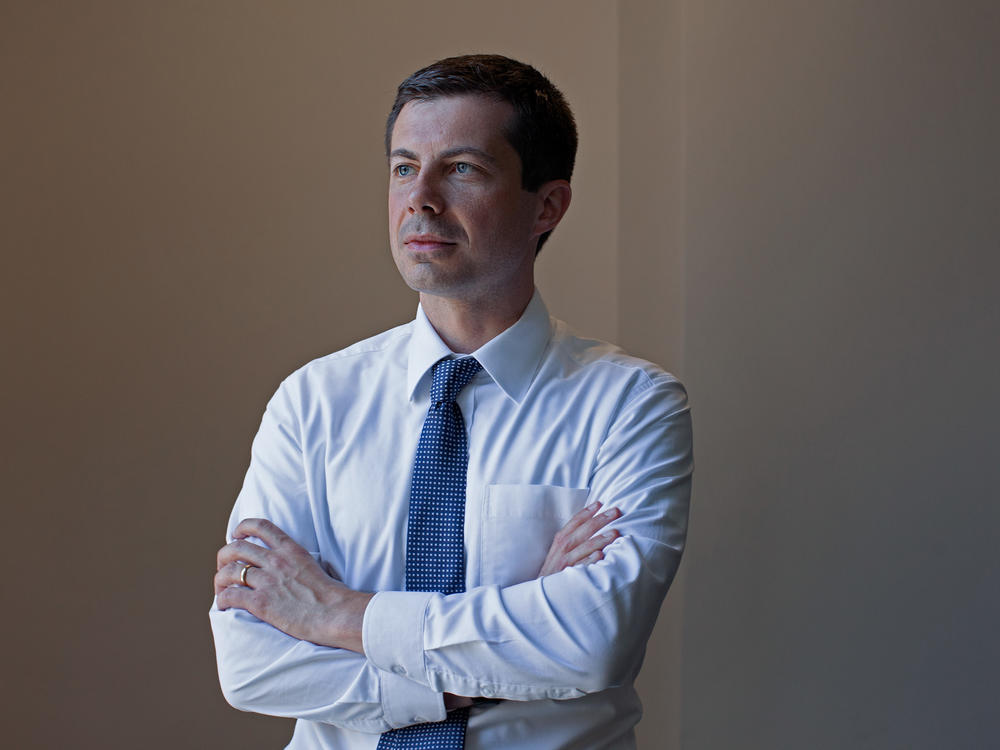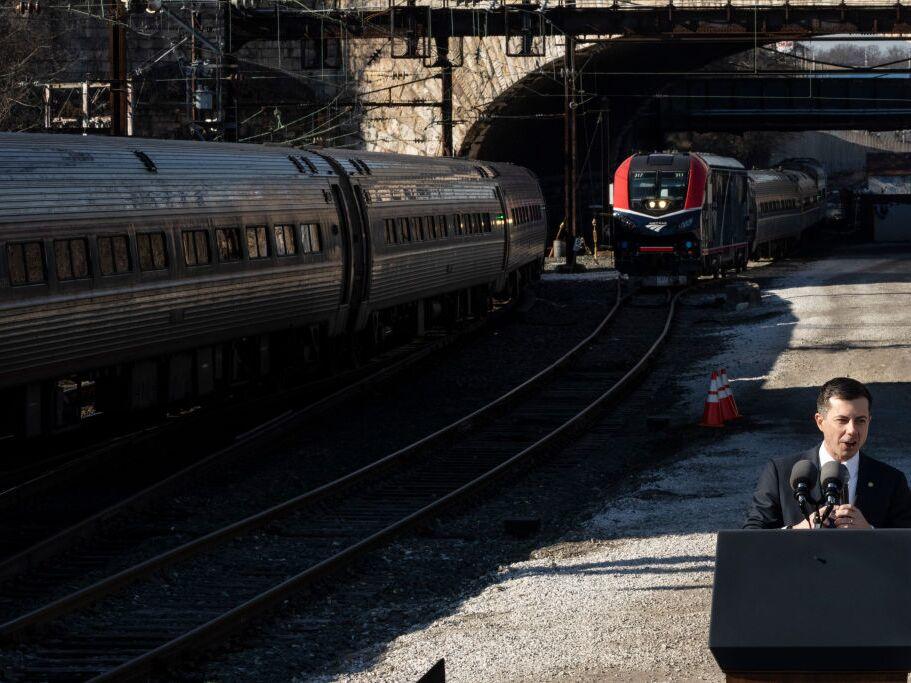Section Branding
Header Content
Exit interview: DOT Sec. Buttigieg on infrastructure act and the road ahead
Primary Content
With barely a week until President-elect Donald Trump's inauguration, Transportation Secretary Pete Buttigieg is packing up his office and preparing for his return to civilian life.
It will be quite a shift after managing the dispersal of billions of dollars in funds as part of President Biden's infrastructure legislation, and managing crises in the airline and railroad sectors.
As he prepares to step down, Buttigieg spoke with All Things Considered host Scott Detrow about some of his accomplishments and the challenges he faced on the job.
This interview has been edited for length and clarity.
Interview highlights
Scott Detrow: I want to start by talking about the thing that probably got the most attention throughout the course of the administration – all the infrastructure spending. I think that's a good example of something that seems to do all of the things that a lot of people think that the voters want from government: investing in communities, fixing problems, coming together to fix those problems, spending at historic levels. You and others in the administration spent years getting the message out there, [and] putting this project into place. I know how many airports you visited to tout these accomplishments, and yet a lot of different metrics, including the election results, suggest that maybe voters didn't quite appreciate, that it didn't seem to land, it didn't seem to be a reaching a consensus of, 'Wow, the Biden administration did this for me.' I'm wondering how you make sense of all of that.
Pete Buttigieg: Well, a lot of the things that we work on are worth doing, whether they're getting a lot of political credit or not. We do safety work to save people from losing their lives on our roadways or in the aviation system. We don't expect people to cheer for us. We just do it because it's the right thing to do, and our infrastructure is something that should just work. That said, I do think that as more and more of these projects go to completion, we're going to see more and more of an appreciation for what this infrastructure era has done to make people better off. We're already seeing levels of employment in construction, building, trades, and manufacturing that we haven't seen in my lifetime. Think about the Affordable Care Act. Took years before people fully appreciated them, and the very nature of infrastructure work is, it takes some time. That said, I'm going to keep telling the story and waving the flag, because it is extraordinary what we did and what will continue to happen in this country. It didn't happen on its own. It was a bipartisan achievement at a time when anything bipartisan is pretty rare in this town. And I think we're going to be benefiting from it for the rest of our lives.
Detrow: That being said, this idea that Americans wanted to see their government working for them more was such a concrete thesis of the Biden administration. It's something that you campaigned and wrote about before you joined this administration. Given where we are at this point in time, the transition of power that's happening, has that made you rethink anything, whether it was the way that this was approached, or the way that it was communicated?
Buttigieg: We always knew that part of what we were doing is turning a very big ship in terms of the condition of American infrastructure and the condition of a lot of things that Americans count on government to do. But that's going to take a lot of time. And the best thing that could come of that, is a higher baseline level of public trust in what government can do for them.
Detrow: Do you think you achieved that?
Buttigieg: Well, I think we set things on a different trajectory, but we're also operating in a different information environment. We're now living in a time where some dude on the internet has as much authority as somebody holding themselves to the highest journalistic standards of fact-checking and research. And that is something that I think can swamp a lot of our more traditional calculations about what makes for good policy and good politics.
Detrow: This very week, there's a concrete moment of stepping away from fact-checking, stepping away from regulations on Facebook in particular. Do you think that's the answer, or do you think it makes us all worse?
Buttigieg: Well, what we've seen so far is that places that have abandoned fact-checking or editorial responsibility have not become a paradise of free speech. Things have taken a pretty dark turn. And so I think we need to continue to find ways to help people sort through and make sense of all of this information that's coming at us. Because right now, we've never had more information in my lifetime, and we've never been less informed.
Detrow: You, up until this point, are the most high-profile millennial to hold national office. I guess Vice President-elect [J.D.] Vance will join that club in a matter of weeks. But as we talk about this, I'm wondering, you came of age with the internet — do you think it's done more harm or good for government, for public policy, at this point in time?
Buttigieg: I think at best it has cut both ways. One thing that I think it has made possible is it's empowered everybody to be a reporter. And there are things that we find out about, including things that have happened in our communities or on our streets that no one would have known about if it weren't possible to record and publicize them through the internet. On the other hand, what we've found is that everybody is a reporter, but nobody's an editor. And the idea that you do in fact have a responsibility to separate fact from fiction, to make judgments about what deserves real scrutiny or real attention, that's something that has really weakened in our society as a result of some of these technologies. Also, for my entire lifetime, you could use a photograph usually to settle a question about whether something was true or false. That's less and less true. And adapting to things like that is really going to test our capacity as a society, as a species.
Detrow: I want to talk about social justice and transportation. You at times talked about Robert Moses — and got the attention of nerds who love "The Power Broker" — but to get to these broader examples of the way that infrastructure and transportation projects were often built in a way that furthered injustice instead of helping to fix it. You talked early on about wanting to take that head-on. Are there areas where you feel like you accomplished that goal?
Buttigieg: We were able, through so many of our projects, to empower the very kinds of people and homes and families and neighborhoods that used to get rolled over by transportation projects in the past. And that's really twofold — both making neighborhoods better off with transit access to places that didn't have it in the past or roads that are built with their neighborhood in mind. But also the jobs we created, I mean, the number of people getting good-paying jobs in the building trades, who are actually literally making these things happen and happened in the neighborhoods where they grew up, is extraordinary. And I believe it's unprecedented. So we've really been able to make a big difference there. Still, a long way to go. It took decades to get the way we are, everything good and everything that needs to change. And it's going to take a while to get to a new reality. But we're well underway in what I like to call this infrastructure decade.
Detrow: When you made those comments, there was this parallel reaction of excitement from people who love thousand-page books and criticism and some of the right-wing press that this was yet another example of identity politics, social justice-type governing. And I'm asking that because in the months since the election, there has been all of this back-and-forth about 'Did Democrats kind of veer too far in that lane? Did that hurt them politically?' I'm wondering what you make about that general conversation, if you have any big takeaways on the policies of the last five or six years, and how people are interpreting them.
Buttigieg: I think it was a reminder of how some voices in the media can get people whipped up over anything, when we're talking about measures that don't make anyone worse off and make a lot of people better off. I will never be able to relate to the idea that it's wrong to confront segregation that neighborhoods still have to live with because of some physical design decision that was made in the '50s or '60s. When we see that, we should put it right, and that's what we set out to do.
Detrow: Do you think there's something to the idea that your party needs to talk about these things in a different way to bring more people along?
Buttigieg: I think any way you come at it, the most important thing is the actions, not the words. I think that there has been a lot of hyperventilating about vocabulary. I think that this is something that you see in different flavors from all sides of the aisle. My side of the aisle gets lost in jargon sometimes, and there's some really troubling things that you see in terms of vocabulary of what comes from the other side of the aisle, too. The bottom line is, we need to do the thing and then figure out how to talk about what we're doing. And the thing that we're doing is fixing roads and bridges across the country.
Detrow: You're going to be a private citizen. You, along with many other Democrats, really raised deep, deep concerns about what a second Trump administration would mean on the rule of law, and democracy, [and] on many other fronts. How are you going to be approaching that? Whatever you do next, how are you going to be responding? Do you have any thoughts about what you will charge yourself with doing when you're out of office?
Buttigieg: What I know is that most Americans believe in some basic values and some very important norms that hold our country together. Frankly, no matter how you voted, a strong majority of Americans believe in making sure that our country is a freedom loving place, that people have rights, and that we solve big problems together. And that's something that I'm going to continue to care about and work on. I'll be doing it as a citizen rather than as a policymaker … I'm going to do everything I can to work on the things that I care about and the things that are going to matter to our family, and [to] Michigan, and to so many people who I've gotten to know along the way in this work.



